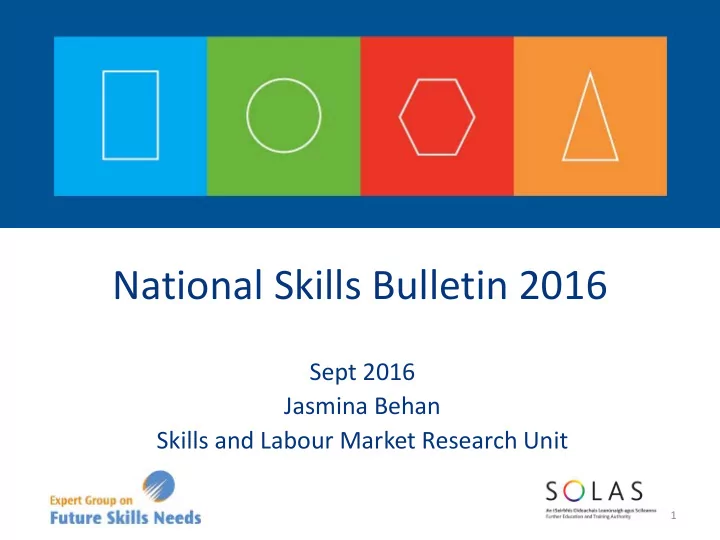

National Skills Bulletin 2016 Sept 2016 Jasmina Behan Skills and Labour Market Research Unit 1
Content National labour market overview Sectoral employment trends and outlook Occupational analysis: • Employment trends and profiles for 135 occupations • Unemployment trends and profiles • Labour market transitions • Vacancies • Sourcing from outside the EEA • Indication of skills and labour shortages 2
Objectives To inform policy design in the areas of • Education and training provision • Active labour market policies • Immigration • Career guidance • Business development 3
National labour market overview Improvements in the labour market in 2015 compared to 2014: employment increased by 50,000 (annual average) the employment rate increased by 1.6 p.p. to 63.3% (annual average) the unemployment level declined by almost 40,000 (annual average) the unemployment rate declined by 1.8 p.p. to 9.5% (annual average) the long term unemployment rate declined to 4.7% (quarter 4) the broad unemployment measure (combining unemployed and part-time underemployed) declined to 13.5% (quarter 4) the labour force increased by 10,400 (annual average) the number of persons in part-time employment who were underemployed decreased by 11,000 (quarter 4) the total number of redundancies declined to 4,342, compared to 77,000 in 2009. 4
National labour market overview However, some issues remained: net migration continued to be negative at -11,600 • net outward migration continued for Irish nationals; at 23,200, it was 6,000 lower than in 2014 the unemployment rate remained high for certain segments of the labour market: • persons with lower secondary or less education (15%) • under 25s (19%) • former construction workers (16%) 5
National labour market overview Of the 1.98m persons in employment in q4 2015: • 45.9% were females; share on q4 2014 • 77.3% were in full-time employment; share on q4 2014 • 83% were employees; share on q4 2014 • 31.6% were under 35 years of age; share on q4 2014 • 44% were at NFQ 7-10; share on q4 2014 • 84.8% were Irish nationals; share on q4 2014 6
Employment (quarter 4 2015) Source: SLMRU Analysis of CSO QNHS data 7
Employment by sector (quarter 4 2015, 000s) Source: SLMRU Analysis of CSO QNHS data 8
Employment growth by sector (quarter 4 2014 - quarter 4 2015) Note: Estimates of employment in agriculture affected by sample changes 9 Source: SLMRU Analysis of CSO QNHS data
Employment by occupation (quarter 4 2015, 000s) Source: SLMRU Analysis of CSO QNHS data 10
Employment growth by occupations (Annualised data 2014-2015) Source: SLMRU Analysis of CSO QNHS data 11
Unemployment • Of the 187,500 unemployed in quarter 4 2015: – 66% were male; share on q4 2014 – 70% were aged 25-54; same as in q4 2014 – 26% held third level; share on q4 2014 – 81% were Irish; share on q4 2014 – 13% previously worked in construction; share on q4 2014 – 13% previously worked each in skilled trades and in elementary occupations; share on q4 2014 12
Unemployment rate by age and education (quarter 4 2015) Source: SLMRU Analysis of CSO QNHS data 13
National Skills Strategy: progress update Source: SLMRU Analysis of CSO QNHS data 14
Labour market transitions Unemployment 81,000 Employment 118,000 162,000 Inter- Intra- occupational occupational 100,000 166,000 144,000 131,000 148,000 Inactivity 15
Labour market transitions (000s) 16
Turnover Turnover Employment Intra- occ. and Intra- 2015 annual neutral inter-occ. occupational average movements Managers 161,800 4.3% 6.5% Professionals 354,800 7.0% 8.4% Assoc. profs. 232,100 7.8% 10.5% Admin. 206,900 7.2% 10.8% Trades 314,000 7.7% 9.1% Personal services 159,500 10.0% 14.6% Sales 162,900 12.5% 17.2% Operatives 146,700 10.2% 13.3% Elementary 213,800 11.7% 18.6% Total 1,963,600 8.4% 13.0% 17
Sourcing from outside the EEA Source: DJEI 18
Vacancies 2015 (Sources: DSP Jobs Ireland, IrishJobs.ie) IrishJobs.ie vacancies -mostly professional/associate professional occupations in IT (e.g. Java, .NET, Oracle/SQL, tech support), engineering, health, sales, business and finance (risk analysts, tax, accountants etc.) DSP Jobs Ireland vacancies – elementary (catering, cleaning, security, construction labourers), care, skilled trades (chefs, construction, welders, mechanics), admin (Census enumerators), operative (drivers, process, etc.) SLMRU Recruitment Agency Survey: increase in number of mentions of difficult to fill vacancies compared to 2014; mentions most frequent for professional/associate professional (IT, engineering, science, health and business) and multilingual roles (e.g. sales/customer care, supply chain) 19
Skill shortages Professionals/associate professionals • ICT (software developers, cloud, databases/big data, testing, security, technical support, – networking and infrastructure) – Engineering (production, process, quality, validation, product design/development, electronic, electrical, mechanical and chemical) – Science (analytical development chemist, formulation scientist, microbiologist, QC analyst/validation technician) – Business & finance (risk, compliance, accounting, business intelligence, data analytics) – Health (doctors, nurses, radiographers, niche area specialists (e.g. prosthetists, radiation therapists, audiologists), managers) Construction (surveyors, project managers) – • Clerical (multilingual financial clerks in fund accounting/administration, credit controllers, payroll specialists) • Skilled trades (chefs, tool making, welding (TIG, MIG), butchers/de-boners, steel-erector) • Sales (technical sales, multilingual customer support) • Operatives (CNC, drivers (fork lift and special vehicle)) • Retention issues (care, chefs, butchers/de-boners, elementary) 20
Recommend
More recommend